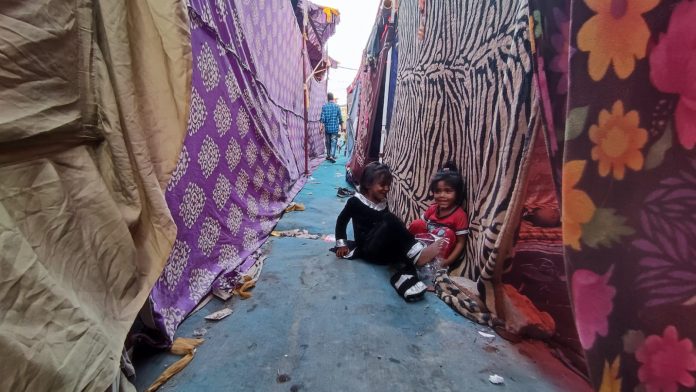When a fire gutted the Rohingya camp in late July, nearly 300 refugees lost everything they had. Forced to stay in temporary tents now, the displaced refugees feel lost and abandoned by the government.
Suchitra | TwoCircles.net
NEW DELHI – Zainab, a 10-year-old Rohingya girl, is residing with her family in a temporary shelter provided by the Zakat Foundation of India. She recalls her camp being burned down last month. “All my toys and books burned down,” she said ruefully.
Zainab, along with other kids from the Rohingya camp that burned down a month ago, used to study in a tent close to the mosque. Today, they can’t even do that. Officials of the Uttar Pradesh Irrigation board razed down the remaining structures on the Madanpur Khadar camp, and a mosque and few washrooms were some of the many structures that were demolished.
Mosque, water pipes, bathrooms razed down
Around 7 a.m. on July 22, an hour after prayers, the demolition began.
“It was not just a place of worship for us, but our children used to study there, and on June 12th, when a huge fire broke out, this mosque was utilized to offer shelter to the elderly,” Zainab’s father told TwoCircles.
He described the mosque as more than just a place of prayer. He said it was a centre for the close-knit community that escaped violence and bloodshed in Myanmar. “Of course it hurts that our place of worship has been razed down. It pains us more that a place of education for our children, a support system for our community has been taken away from us,” he said.
Pravir Singh, the subdivisional magistrate for the region, maintains he was unaware of the mosque’s demolition and that he is not qualified to make an official remark on the subject.
According to Saeeda Khatoon, a 29-year-old Rohingya woman, the demolition was well-planned. She claims she no longer has access to even a toilet because UP irrigation authorities damaged pipelines and washrooms.
“They directed the refugees living in tents in the area of the camp that is on UP Irrigation property to shift to roadside tents. After that, they demolished mosques, washrooms, water pipes, and everything that their eyes could see,” she sighed.
The refugees will not be permitted to reconstruct their shelters. They cannot own land unless they have Indian citizenship. They have no legal protection from eviction since the government does not recognize them as refugees.
‘Right wing’ threats of violence
Recently, Union Minister Nityanand Rai stated in a written response to parliament that, “illegal immigrants pose a threat to national security and there are reports by some of them indulging in illegal activities.”
“The Rohingya are having a difficult existence in India, where they suffer hatred and violence from Hindu right-wing groups,” said Minara, a community activist.
“First, their homes were destroyed by fire, and now their mosque and restrooms have been razed. This is a flagrant violation of the refugees’ human religious rights.”
According to Ali Johar, a Rohingya community leader in New Delhi, “refugees are also humans, and the right to religion is a basic right in India.”
Many media houses and government leaders treat the Rohingya issue with a communal angle and want to paint them as a threat.
Sufia, a 26-year-old woman holds her child Safikhur, and wipes away her tears. “In the days before the fire, we received some threats from people. They were not in any uniform and seemed like regular people. We have been threatened previously, but it had become more rampant in the days just before the fire. We know the fire wasn’t an accident, and so was the razing of our place of worship.”
The UN Refugee Agency has issued some of them with refugee cards, which allows them to access necessities and shield them from police action.
Kabir Khan, a 19-year-old refugee, claimed his father suffered minor injuries while attempting to rescue their refugee identity cards, which are frequently required to access government services such as medical care and school enrollment.
No government has yet tried to help the refugees. The SDM has set up some tents but there is no formal action by the Delhi government or an offer to an alternative place by the UP Irrigation Board.
In January 2021, India launched the world’s largest vaccination drive but not a single person from the persecuted community has been vaccinated. Many Rohingya refugees said the vaccines are the least of their worries. “We would die of poverty before we die to lack of vaccination. We need help. Somebody must help us,” they said.
Zainab went on to play with Safikhur Nihar, holding him in her arms. Her father asked, “What has my child done to deserve this? She was born here, not in Myanmar, why does this country offer so much hatred to children like her?”


